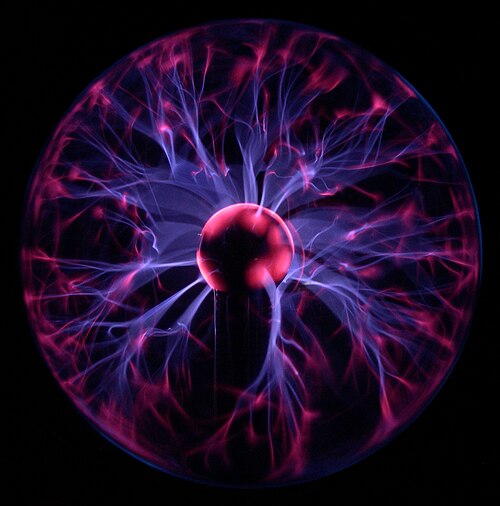Energynoun
The impetus behind all motion and all activity.
Energynoun
The capacity to do work.
Energynoun
(physics) A quantity that denotes the ability to do work and is measured in a unit dimensioned in mass × distance²/time² (ML²/T²) or the equivalent.
Energynoun
An intangible, modifiable force (often characterized as either 'positive' or 'negative') believed in some New Age religions to emanate from a person, place or thing and which is (or can be) preserved and transferred in human interactions; shared mood or group habit; a vibe, a feeling, an impression. aura.}}
Energynoun
A measure of how many actions a player or unit can take; in the fantasy genre often called magic points or mana.
Energynoun
Internal or inherent power; capacity of acting, operating, or producing an effect, whether exerted or not; as, men possessing energies may suffer them to lie inactive.
Energynoun
Power efficiently and forcibly exerted; vigorous or effectual operation; as, the energy of a magistrate.
Energynoun
Strength of expression; force of utterance; power to impress the mind and arouse the feelings; life; spirit; - said of speech, language, words, style; as, a style full of energy.
Energynoun
Capacity for performing work.
Energynoun
(physics) the capacity of a physical system to do work; the units of energy are joules or ergs;
Energynoun
an exertion of force;
Energynoun
enterprising or ambitious drive;
Energynoun
an imaginative lively style (especially style of writing);
Energynoun
a healthy capacity for vigorous activity;
Energynoun
the federal department responsible for maintaining a national energy policy of the United States; created in 1977
Energy
In physics, energy is the quantitative property that must be transferred to a body or physical system to perform work on the body, or to heat it. Energy is a conserved quantity; the law of conservation of energy states that energy can be converted in form, but not created or destroyed.
Matternoun
Substance, material.
Matternoun
(physics) The basic structural component of the universe. Matter usually has mass and volume.
Matternoun
(physics) Matter made up of normal particles, not antiparticles. (Non-antimatter matter).
Matternoun
A kind of substance.
Matternoun
Written material (especially in books or magazines).
Matternoun
(philosophy) Aristotelian: undeveloped potentiality subject to change and development; formlessness. Matter receives form, and becomes substance.
Matternoun
A condition, subject or affair, especially one of concern.
Matternoun
An approximate amount or extent.
Matternoun
(obsolete) The essence; the pith; the embodiment.
Matternoun
(obsolete) Inducing cause or reason, especially of anything disagreeable or distressing.
Matternoun
(dated) Pus.
Matterverb
(intransitive) To be important.
Matterverb
To care about, to mind; to find important.
Matterverb
To form pus or matter, as an abscess; to maturate.
Matternoun
That of which anything is composed; constituent substance; material; the material or substantial part of anything; the constituent elements of conception; that into which a notion may be analyzed; the essence; the pith; the embodiment.
Matternoun
That of which the sensible universe and all existent bodies are composed; anything which has extension, occupies space, or is perceptible by the senses; body; substance.
Matternoun
That with regard to, or about which, anything takes place or is done; the thing aimed at, treated of, or treated; subject of action, discussion, consideration, feeling, complaint, legal action, or the like; theme.
Matternoun
That which one has to treat, or with which one has to do; concern; affair; business.
Matternoun
Affair worthy of account; thing of consequence; importance; significance; moment; - chiefly in the phrases what matter? no matter, and the like.
Matternoun
Inducing cause or occasion, especially of anything disagreeable or distressing; difficulty; trouble.
Matternoun
Amount; quantity; portion; space; - often indefinite.
Matternoun
Substance excreted from living animal bodies; that which is thrown out or discharged in a tumor, boil, or abscess; pus; purulent substance.
Matternoun
That which is permanent, or is supposed to be given, and in or upon which changes are effected by psychological or physical processes and relations; - opposed to form.
Matternoun
Written manuscript, or anything to be set in type; copy; also, type set up and ready to be used, or which has been used, in printing.
Matterverb
To be of importance; to import; to signify.
Matterverb
To form pus or matter, as an abscess; to maturate.
Matterverb
To regard as important; to take account of; to care for.
Matternoun
that which has mass and occupies space;
Matternoun
a vaguely specified concern;
Matternoun
some situation or event that is thought about;
Matternoun
a problem;
Matternoun
(used with negation) having consequence;
Matternoun
written works (especially in books or magazines);
Matterverb
have weight; have import, carry weight;
Matternoun
physical substance in general, as distinct from mind and spirit; (in physics) that which occupies space and possesses rest mass, especially as distinct from energy
Matternoun
a particular substance
Matternoun
written or printed material
Matternoun
a subject or situation under consideration
Matternoun
something which is to be tried or proved in court; a case.
Matternoun
the present state of affairs
Matternoun
the reason for distress or a problem
Matternoun
the substance or content of a text as distinct from its style or form.
Matternoun
the body of a printed work, as distinct from titles, headings, etc.
Matternoun
the particular content of a proposition, as distinct from its form.
Matterverb
be important or significant
Matterverb
(of a person) be important or influential
Matterverb
(of a wound) secrete or discharge pus.
Matter
In classical physics and general chemistry, matter is any substance that has mass and takes up space by having volume. All everyday objects that can be touched are ultimately composed of atoms, which are made up of interacting subatomic particles, and in everyday as well as scientific usage, generally includes atoms and anything made up of them, and any particles (or combination of particles) that act as if they have both rest mass and volume.















